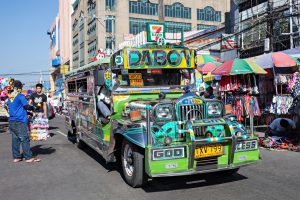The year 2023 ended in the Philippines with several transport groups holding nationwide protests aimed at pressuring the government to reconsider its program that will lead to the phaseout of jeepneys.
The jeepneys were World War II surplus vehicles of the U.S. military before they were modified and used by Filipinos for transporting people and goods. Since then, jeepneys have become the country’s main mode of public transportation.
After years of delay, the government of President Ferdinand Marcos Jr. said it would fully implement the modernization of the country’s land transportation system, which includes the replacement of the iconic jeepneys with bigger and energy-efficient vehicles. It reiterated the goal of “easing the plight of commuters by ensuring cleaner and safer means of public transportation for the riding public.”
Jeepney operators responded by reminding the government that while they support the improvement of the transport system, their views should be considered too, especially in pursuing programs that will displace more than half a million people. A transport strike in March 2023 forced the government to move the deadline for the consolidation of jeepney franchises.
Authorities clarified that roadworthy jeepneys will not be phased out as they encouraged drivers and operators to form cooperatives and apply for franchise consolidation. But those who refused to support the government’s consolidation program warned that the so-called modern or e-jeepneys are merely mini-buses or large vans imported from other countries. They added that ordinary jeepney drivers cannot afford to buy the modern vehicles the government promotes without incurring a huge debt.
Jeepney passengers have also expressed concern that the phaseout of traditional vehicles will lead to a transport crisis and higher fares. Activists accused the government of designing a transport program for the benefit of big corporations and foreign investors to the detriment of 300,000 drivers and small entrepreneurs. They urged the government to prioritize local manufacturing by supporting homegrown producers of jeepneys.
Even legislators are worried about the harmful impact of the program. The president’s sister, Senator Imee Marcos, advised the government to revoke the “deadly deadline.”
She added: “Clearly, there is a need to return to exhaustive meetings and consultations with all groups of operators, drivers, and commuters. Who doesn’t want a new vehicle? But with the high cost of living, how many can afford one?”
Senator Grace Poe questioned the assurance given by some officials that subsidies will be given to jeepney drivers since the 2024 national budget has no item for this. As an alternative, she filed a bill that proposes the rollout of a “just and humane” public utility vehicle modernization program.
Transport strikes and protests were organized throughout the year but the Marcos government insisted that the majority of stakeholders are behind its modernization program. Before the end of the year, authorities finally admitted that only 30 percent of jeepneys had applied for consolidation. To prevent passengers from being stranded in the streets, officials said they will issue special permits for some jeepneys which will only be valid for one month.
Aside from holding a large protest near the presidential palace, transport groups were also joined by consumers and activists in filing a petition in the Supreme Court challenging the constitutionality of the government’s transportation program. They argued that the mandatory franchise consolidation provision of the program undermines property rights aside from unreasonably singling out jeepneys. Government agencies have ten days to respond so it may take at least two more weeks if the Court decides in favor of issuing a temporary restraining order.
Meanwhile, the franchise of most jeepneys already expired on December 31 and drivers could face arrest if they continue to operate in 2024. Various local agencies said they are ready to provide free rides by deploying buses, tricycles, and even government vehicles. Are they enough to accommodate all passengers and how long can the government sustain this?
Responding to the concern that phasing out jeepneys will exacerbate the transport crisis, officials said public inconvenience will only be brief once the government has reorganized routes and rationalized the transport system. However, they didn’t mention the duration of the transition period and the immense daily hardships that riders, passengers, and displaced jeepney drivers will experience.
Indeed, the riding public is clamoring for a better transport system. But what the recent transport protests also revealed was the enduring popularity of jeepneys which remain accessible and affordable to many. It is a reminder to the Marcos government that it cannot simply redesign the roads of the future by removing the beloved and old reliable Philippine jeepneys.

































